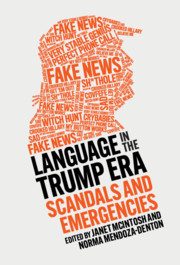Book contents
- Language in the Trump Era
- Language in the Trump Era
- Copyright page
- Dedication
- Contents
- Figures
- Tables
- Contributors
- Acknowledgments
- Note on Transcription Conventions
- Note on Ethnonyms and Phenotypic Descriptors
- Introduction: The Trump Era as a Linguistic Emergency
- Part I Dividing the American Public
- Part II Performance and Falsehood
- Part III The Interactive Making of the Trumpian World
- Part IV Language, White Nationalism, and International Responses to Trump
- Index
- References
Introduction: The Trump Era as a Linguistic Emergency
Published online by Cambridge University Press: 18 September 2020
- Language in the Trump Era
- Language in the Trump Era
- Copyright page
- Dedication
- Contents
- Figures
- Tables
- Contributors
- Acknowledgments
- Note on Transcription Conventions
- Note on Ethnonyms and Phenotypic Descriptors
- Introduction: The Trump Era as a Linguistic Emergency
- Part I Dividing the American Public
- Part II Performance and Falsehood
- Part III The Interactive Making of the Trumpian World
- Part IV Language, White Nationalism, and International Responses to Trump
- Index
- References
Summary
This substantial introduction covers Trump’s divisive verbal shock tactics during his rise. It offers a history of presidential oratory and speech style, discusses Trump’s use of social media, and his rhetorical feedback loop with his supporters. It analyzes the way the “culture wars” over so-called “politically correct language” feed into Trump’s popularity and the dismay of his critics. Trump supporters often refuse the notion that word choice creates problems, arguing instead that linguistic care stokes oversensitivity, or that it evades harsh realities that harsh language merely describes. They also feel his simple, profane verbal style and even his spelling and grammatical errors reflect his “authenticity” and positive masculinity. Trump’s critics, meanwhile, believe his insulting words and hate speech incite violence while his style denotes lack of education and care, possibly even dementia, while demoting the verbal standards expected of a president. Disagreements over Trump’s verbal style and propriety have sometimes played out over class lines. Trump’s well documented prevarications have exhausted journalists and seemed to influence his supporters, some of whom take his statements as merely hyperbolic articulations of a deeper underlying truth.
Keywords
- Type
- Chapter
- Information
- Language in the Trump EraScandals and Emergencies, pp. 1 - 44Publisher: Cambridge University PressPrint publication year: 2020
References
- 12
- Cited by



